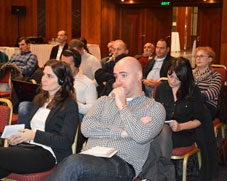
Trans-border project discussed in Tbilisi
By Gvantsa Gabekhadze
Friday, October 31
Lessons learned from three years of implementation of the project Local Actors for Inclusive Economic Development in the South Caucuses (JOIN), which was implemented by CARE International in the Caucasus together with implementing partners in Georgia-Civil Development Agency (CiDA) –and in Armenia-Centre for Agribusiness and Rural Development (CARD) were presented on October 29. The project is funded by the Austrian Development Agency and CARE Australia.
According to the representatives of CARE, the project aimed at poverty reduction in the border regions of Georgia and Armenia through improved cooperation of three vital actors: the government, civil society and the private sector and covered three main areas of activity: facilitating joint, inclusive and participative processes in the project’s 12 target areas to create development plans that focuses on each area’s strengthening. The approach took into account the needs of marginalized groups as well as the different needs of men and women; making available in the target regions market-relevant information and training in business skills through the establishment of Business Development and Information Centers based on sustainably operating models; facilitation the flow of information between the target regions and the capitals to help address local development needs.
The major outcome of the project was elaborating a supporting strategy and an action plan for the information-consulting centers under the Ministry of Agriculture in Georgia. Herewith, the information centers were equipped with office furniture and techniques; development action plans of Kvemo Kartli and Samtskhe-Jvakheti regions were drafted and agro-business grants were issued- 7 in Armenia and 4 in Georgia.
Partnership and Governance Coordinator of CARE Juba Maruashvili says that the importance of the project is because of its location and area, as this is a trans-boundary project between Georgia and Armenia, active involvement of both sides have been decisive in order to achieve success. In his interview with The Messenger, Maruashvili highlighted on some challenges they have faced during the project implementation. More precisely, one of the major challenges was improvement of the quality of coordination with donor organisations and locally based institutions, as there were working other donor organizations at the same time. According to him, despite the serious attempts, it has been hardly managed to maintain coordination between the donor organizations which would make the mutual activities more successful.
Head of CiDA Zviad Devdariani stressed that the project was very challenging as it included various activities in two countries, which face similar and sometime dissimilar difficulties in the field. He admitted that Armenia is among Georgia’s top ten trade partners and there is an option for more promotion of the partnership. However, Devdariani emphasized that none of the activities of the NGOs or various projects would be fully helpful if there is no governments’ involvement for resolving agricultural and some other state-related stoppages.
It should be stressed that the current government named agriculture as its priority. However, even the government members recognize that the field still faces multiple drawbacks. Analysts frequently criticize the government for its inconsistent policy in several fields, agriculture among them.
The government representatives attending the meeting thanked the organizations and NGOs for their helpful projects, intentions and initiatives and promised that the government would take their remarks and positive suggestions into account. Gocha Tsopurashvili, deputy minister of agriculture of Georgia stated that the government inherited a poor heritage from the previous government in terms of agriculture. He promised that the ministry will shortly represent a 5-year action plan in the field of agriculture that will be focused on regional development and decentralization.


